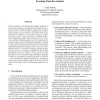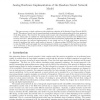1512 search results - page 237 / 303 » Principles of IEEE 802.11s |
ASWEC
2000
IEEE
14 years 2 months ago
2000
IEEE
Formal methods are becoming increasingly important in many areas of software development and should be incorporated in the teaching of software engineering. Requirements capture i...
COMPSAC
2000
IEEE
14 years 2 months ago
2000
IEEE
Genetic programming tackles the issue of how to automatically create a working computer program for a given problem from some initial problem statement. The goal is accomplished i...
CVPR
2000
IEEE
14 years 2 months ago
2000
IEEE
We use cluster analysis as a unifying principle for problems from low, middle and high level vision. The clustering problem is viewed as graph partitioning, where nodes represent ...
ICDCS
2000
IEEE
14 years 2 months ago
2000
IEEE
Buffered coscheduling is a distributed scheduling methodology for time-sharing communicating processes in a distributed system, e.g., PC cluster. The principle mechanisms involved...
IJCNN
2000
IEEE
14 years 2 months ago
2000
IEEE
This paper presents a simple continuous analog hardware realization of the Random Neural Network (RNN) model. The proposed circuit uses the general principles resulting from the u...


